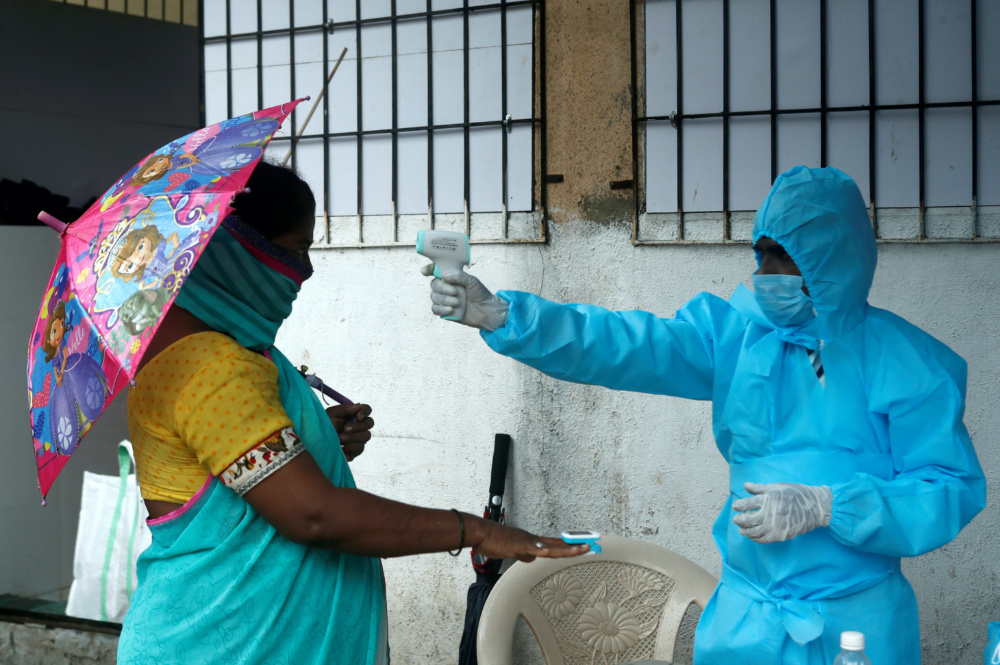Global coronavirus cases pushed past 20 million on Monday, according to a Reuters tally, with the United States, Brazil and India accounting for more than half of all known infections.
The respiratory disease has infected at least four times the average number of people struck down with severe influenza illnesses annually, according to the World Health Organization.
The death toll from COVID-19, meanwhile, at more than 728,000 has outpaced the upper range of annual deaths from the flu.

A healthcare worker checks the temperature and pulse of a resident during a check-up camp for the coronavirus disease (COVID-19), in Mumbai, India, on 4th July. PICTURE: Reuters/Francis Mascarenhas/File photo
The Reuters tally, which is based on government reports, shows the disease is accelerating. It took almost six months to reach 10 million cases after the first infection was reported in Wuhan, China, in early January. It took just 43 days to double that tally to 20 million.
Experts believe the official data likely undercounts both infections and deaths, particularly in countries with limited testing capacity.
The United States is responsible for around five million cases, Brazil three million and India two million. Russia and South Africa round out the top ten.
The pandemic is accelerating fastest in Latin America which accounts for almost 28 per cent of the world’s cases and more than 30 per cent of deaths, according to the Reuters tally.
With the first wave of the virus yet to peak in some countries and a resurgence of cases in others, governments are still divided in their responses. Some countries are reintroducing strict public health measures, while others continue to relax restrictions.
Health experts expect dilemmas about how to proceed with school, work and social life to last – and restrictions to fluctuate – until a vaccine is available.
The vaccine race has more than 150 candidates being developed and tested around the world with 25 in human clinical trials, according to the World Health Organization.
In the United States, children began returning to their classrooms last week, even as controversy over school safety swirled.
Britain has added both Spain and Belgium to a list of countries from which returning travellers must quarantine at home for 14 days because of fresh upticks in some European locations.
In Asia, China continues to squash surges using strict, local lockdowns, bringing its daily numbers down into the low double digits on the mainland.
Australia has introduced a strict lockdown and night curfew in the city of Melbourne, aiming to stifle an outbreak there. Neighbouring New Zealand, where life has largely returned to normal, on the weekend recorded 100 days with no new cases of local transmission.
Meanwhile, World Health Organization chief Tedros Adhanom Ghebreyesus said on Monday tha there is a “vast global gap” between funds needed to fight the coronavirus pandemic and funds committed, – with the WHO was only “10 per cent of the way” there.
“The coming three months present a crucial window of opportunity to scale-up the impact of the ACT Accelerator for global impact,” Tedros told a briefing in Geneva, referring to the “Access to COVID-19 Tools” initiative.
“However to exploit this window, we have to fundamentally scale up the way we are funding the ACT Accelerator and prioritise the use of new tools. There is a vast global gap between our ambition for the ACT Accelerator, and the amount of funds that have been committed.”
He said the WHO was only “10 per cent of the way” to funding the billions of dollars required.
“For the vaccines alone, over $US100 billion will be needed,” Tedros said. This sounds like lot of money and it is.
“But it’s small in comparison to the $US10 trillion that have already been invested by G20 countries in fiscal stimulus to deal with the consequences of the pandemic so far.”
However, he said he saw “green shoots of hope”.
“It is never too late to turn the pandemic around,” Tedros said. The message is to “suppress, suppress, suppress”.
Dr Mike Ryan, head of WHO’s emergencies programme, said the coronavirus was simple, brutal and cruel.
“It’s brutal in its simplicity, it is brutal in its cruelty, but it doesn’t have a brain,” he said. “We have the brains…we can outsmart something that doesn’t have a brain but we are not doing such a great job right now.”
Ryan said that Brazil is registering 50,000 to 60,000 cases per day.
“Brazil is sustaining a very high level of epidemic, the curve is somewhat flattened, but it’s not going down and the system is under great deal of pressure.
“In a situation like that, hydroxychloroquine is not a solution and not a silver bullet,” he added, referring to the malaria drug which President Jair Bolsonaro has encouraged Brazilians to take against COVID-19.
– With MICHAEL SHIELDS and JOHN MILLER





